- Python Basic Programs
- Python Program Examples
- Python Print Hello World
- Python Get Input from User
- Python Add Two Numbers
- Add Subtract Multiply Divide
- Python Check Even or Odd
- Python Check Prime or Not
- Python Check Alphabet or Not
- Python Check Vowel or Not
- Python Check Leap Year or Not
- Check Reverse equal Original
- Check Positive Negative Zero
- Python Check Armstrong or Not
- Python Check Palindrome or Not
- Python Check Perfect Number
- Python Find Reverse of Number
- Python Count Digits in Number
- Python Add Digits of Number
- Sum of First and Last Digits
- Python Product of Mid Digits
- Sum of Squares of Digits
- Interchange Digits of Number
- Python Sum of n Numbers
- Python Print ASCII Values
- Python Swap Two Numbers
- Python Swap Two Variables
- Python Fahrenheit to Celsius
- Python Celsius to Fahrenheit
- Python Display Calendar
- Python Days into Years, Weeks
- Find Largest of Two Number
- Find Largest of Three Number
- Python Print Fibonacci Series
- Generate Armstrong Numbers
- Python Make Simple Calculator
- Python Add Binary Numbers
- Binary Number Multiplication
- Python Mathematical Programs
- Find Sum of Natural Numbers
- Find Average of n Numbers
- Python Print Multiplication Table
- Print Table using Recursion
- Python Find Average Percentage
- Python Find Grade of Student
- Find Square Root of Number
- Python Print Prime Numbers
- Find Numbers Divisible by
- Python Find Factors of Number
- Python Find Factorial of a Number
- Python Find HCF & LCM
- Python Kilometres to Miles
- Python Find Area of Square
- Python Find Area of Rectangle
- Python Find Area of Triangle
- Python Find Area of Circle
- Python Find Perimeter of Square
- Find Perimeter of Rectangle
- Python Find Perimeter of Triangle
- Find Circumference of Circle
- Python Simple Interest
- Python Solve Quadratic Equation
- Python Different Set of Operations
- Python Display Powers of 2
- Python Find nCr & nPr
- Python Pattern Programs
- Python Print Pattern Programs
- Python Print Diamond Pattern
- Python Print Floyd's Triangle
- Python Print Pascal's Triangle
- Python List Programs
- Python Count Even/Odd in List
- Python Positive/Negative in List
- Python Even Numbers in List
- Python Odd Numbers in List
- Python Sum of Elements in List
- Sum of Odd/Even Numbers
- Python Element at Even Position
- Python Element at Odd Position
- Python Search Element in List
- Python Largest Number in List
- Python Smallest Number in List
- Python Second Largest in List
- Python Second Smallest in List
- Python Insert Element in List
- Python Delete Element from List
- Python Multiply Numbers in List
- Swap Two Elements in List
- Python 1D Array Program
- Python Linear Search
- Python Binary Search
- Python Insertion Sort
- Python Bubble Sort
- Python Selection Sort
- Remove Duplicates from List
- Python Reverse a List
- Python Merge Two List
- Python Copy a List
- Python Conversion Programs
- Python Decimal to Binary
- Python Decimal to Octal
- Python Decimal to Hexadecimal
- Python Binary to Decimal
- Python Binary to Octal
- Python Binary to Hexadecimal
- Python Octal to Decimal
- Python Octal to Binary
- Python Octal to Hexadecimal
- Python Hexadecimal to Decimal
- Python Hexadecimal to Binary
- Python Hexadecimal to Octal
- Python Matrix Programs
- Python Add Two Matrices
- Python Subtract Two Matrices
- Python Transpose Matrix
- Python Multiply Matrices
- Python String Programs
- Python Print String
- Python Find Length of String
- Python Compare Two Strings
- Python Copy String
- Python Concatenate String
- Python Reverse a String
- Python Swap Two Strings
- Python Uppercase to Lowercase
- Python Lowercase to Uppercase
- Python Check Substring in String
- Python Count Character in String
- Count Repeated Characters
- Python Count Word in Sentence
- Python Count Each Vowels
- Python Capitalize Character
- Python Capitalize Word in String
- Python Smallest/Largest Word
- Remove Spaces from String
- Remove Duplicate Character
- Remove Vowels from String
- Remove Punctuation from String
- Python Remove Word in String
- Python Remove Duplicate Words
- WhiteSpace to Hyphens
- Replace Vowels with Character
- Replace Character in String
- Python Sort String in Alphabetical
- Sort Word in Alphabetical Order
- Extract Number from String
- Python Check Anagram Strings
- Python File Programs
- Python Read a File
- Python Write to File
- Python Append Text to File
- Python Copy Files
- Python Merge Two Files
- Python Counts Characters in File
- Python Count Words in File
- Python File Content in Reverse
- Python Lines Contains String
- Python Delete Line from File
- Python Capitalize Word in File
- Python Replace Text in File
- Replace Specific Line in File
- Python Find Size of File
- Python List Files in Directory
- Python Delete Files
- Python Misc Programs
- Python Reverse a Tuple
- Python Merge Two Dictionary
- Python bytes to String
- Python bytearray to String
- Generate Random Numbers
- Python Print Address of Variable
- Python Print Date and Time
- Python Get IP Address
- Python Shutdown/Restart PC
- Python Tutorial
- Python Tutorial
Python Program to Multiply all Numbers in List
This article is created to cover some programs in Python that multiplies all numbers in a list, in different-different ways. Here are the list of programs:
- Multiply all numbers in a list of 5 elements (numbers)
- Multiply all numbers in a list of n elements
- Multiply all numbers in a list except 0
- Multiply all numbers in a list, with a given number by user
Multiply All Numbers in a List Together
The question is, write a Python program that receives 5 numbers form user and multiplies all those 5 numbers together. The program given below is answer to this question:
nums = [] print("Enter 5 Numbers: ") for i in range(5): nums.append(int(input())) mul = 1 for i in range(5): mul = mul*nums[i] print("\nMultiplication Result: ") print(mul)
Here is the initial output of this program's sample run:
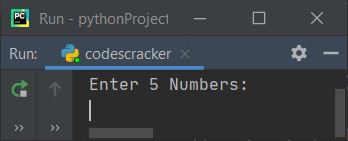
Now supply inputs say 1, 2, 3, 4, 5 as five numbers of list, to multiply all these elements and print the multiplication result as shown in the snapshot given below:
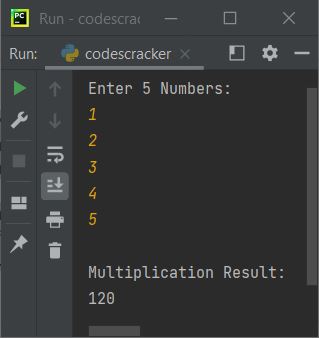
Multiply all Numbers in a List of n Numbers
This is the modified version of previous program. That is, this program allows user to define the size of list, then further ask to enter all the numbers of given size. For example, if user enters 10 as size, then program ask to enter 10 numbers, then multiplies all 10 numbers together and prints the multiplication result like shown in the program given below:
nums = list() print(end="Enter the Size: ") numsSize = int(input()) print(end="Enter " +str(numsSize)+ " Elements: ") for i in range(numsSize): nums.append(int(input())) mul = 1 for i in range(numsSize): mul = mul*nums[i] print("\nMultiplication Result = " +str(mul))
Here is its sample run with user input 5 as size, and 2, 4, 6, 7, 3 as five numbers:
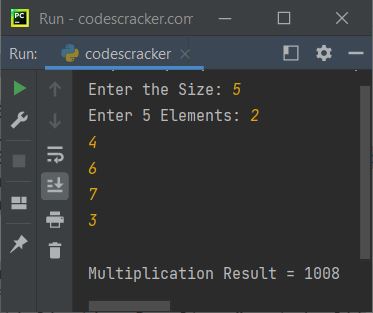
Multiply all Numbers in List except 0
What if user enters some numbers in a list, that contains one or more zero (0) ?
Then multiplying all numbers of the list gives the result as 0. Therefore this program multiplies all numbers
except zero. Let's have a look at the program and its sample run given below:
nums = list() mul = 1 print(end="Enter the Size: ") numsSize = int(input()) print(end="Enter " +str(numsSize)+ " Elements: ") for i in range(numsSize): nums.append(int(input())) if nums[i]!=0: mul = mul*nums[i] print("\nMultiplication Result = " +str(mul))
Here is its sample run with user input, 6 as size, and 1, 3, 0, 2, 5, 4 as six numbers:
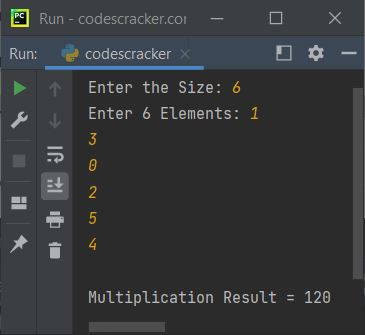
Multiply all Numbers in List by Given Number (Constant)
This is the last program of this article. This program is little different from all the above programs. Since this program doesn't multiply all numbers of a list together. Rather this program multiplies all numbers of list with a number entered by user. And then prints the new list after multiplying each and every element of the list with given number like shown in the program and its sample output given below:
print(end="Enter the Size: ") numsSize = int(input()) nums = list() print(end="Enter " +str(numsSize)+ " Elements: ") for i in range(numsSize): nums.append(int(input())) print(end="\nEnter a Number to Multiply: ") val = int(input()) newnums = list() for i in range(numsSize): newnums.append(val*nums[i]) print("\nThe New List is:") for i in range(numsSize): print(end=str(newnums[i])+ " ") print()
Here is its sample run with user input, 4 as size, 10, 20, 30, 40 as four numbers, then 3 as number to multiply with:
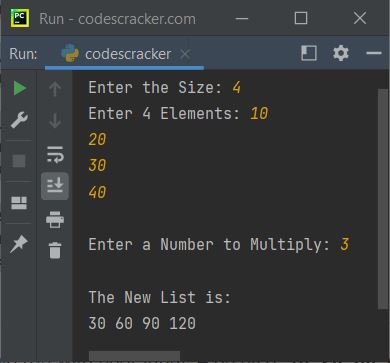
Here is another sample run with user input, 5 as size, 0, 1, 2, 3, 4 as five elements, and 2 as number to multiply with:
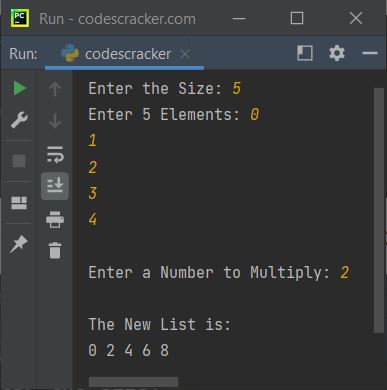
« Previous Program Next Program »